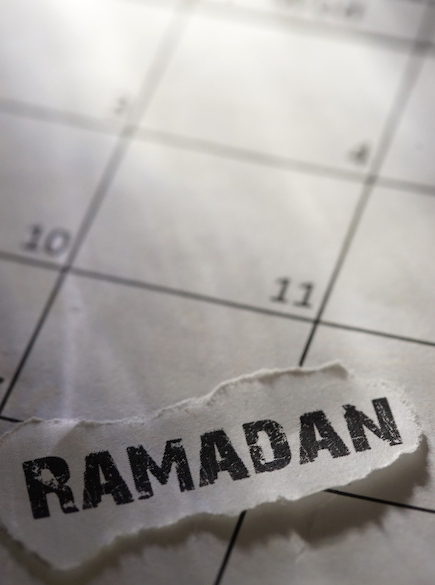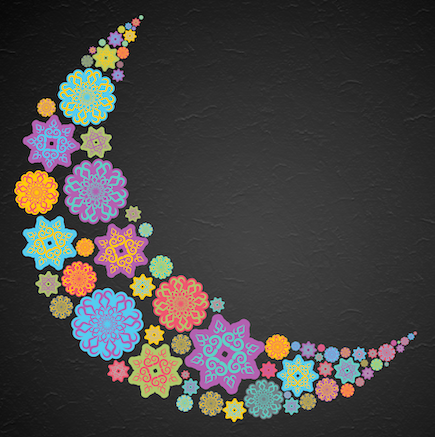Are you med-ready for Ramadan? Tips from Wayne State pharmacy experts
One of the five pillars of Islam, Ramadan is the lunar month during which Muslims refrain from eating and drinking from dawn until dusk — and that includes oral and injectable medications. This year, Ramadan will begin on March 11 or 12, depending on when the moon is sighted, and last 29 to 30 days until around April 9.
Depending on how late in the year Ramadan falls, it can mean 12 hours or more of fasting between dawn and sunset. Those observing Ramadan often tend to reduce their physical activities, spend more time resting or sleeping during the day, and have major changes in what they eat and when they eat it.
Typically, the eating pattern consists of a large meal at sunset, called iftar, and a light meal before dawn, called suhoor, with plenty of sweets, dates, fruits and juices in between the two. Meals often include higher amounts of fried foods and carbohydrates than what is typically eaten throughout the rest of the year. Then, Eid Al-Fitr follows Ramadan — a three-day festival characterized by sharing delicious food and sweets.
Clinical pharmacists from the Wayne State University Eugene Applebaum College of Pharmacy and Health Sciences Doctor of Pharmacy program note that those observing Ramadan may have questions about how to take their medications during the month, while others may simply decrease their medications or take them irregularly without proper guidance.
“Islamic scholars exempt elderly individuals with poor health from mandatory Ramadan fasting, allowing for fasting exemption through charitable acts called fidyah if chronic illness and socioeconomic conditions permit. Despite this, some may still choose to fast based on spiritual preferences,” said Professor of Pharmacy Practice Linda Jaber. “Although religious exemption may also apply to those with diabetes, many people choose to observe Ramadan against medical advice due to the belief that fasting fosters physical and spiritual purification. Because of this, Ramadan can create a medical challenge for patients with chronic conditions and their health care providers.”
Studies have shown that many patients avoid consulting medical professionals about fasting due to past negative experiences, fear of disrespectful treatment, or the assumption that they’ll be given a blanket prohibition on fasting without well-informed explanations.
DOWNLOAD: What every health care professional should know
Unfortunately, the pattern of fasting and the types of foods eaten during iftar and suhoor can affect the general well-being of patients with chronic conditions such as diabetes and hypertension.
“In patients with diabetes, it’s incredibly difficult to adhere to prescribed dietary regimens, so those regimens are often ignored,” Jaber added. “Fasting can potentially lead to deterioration of the metabolic control and can increase the risks of hypoglycemia, hyperglycemia and dehydration during the 12- to 14-hour fasting period.”
Patients with type 1 diabetes and pregnant women with diabetes are strongly advised not to fast due to the potentially serious risk of complications. However, studies performed in Asia and the Middle East have generally demonstrated the safety of fasting in most patients with type 2 diabetes, provided that pre-Ramadan-focused education and appropriate dosage adjustments of oral and injectable agents (insulin products in particular) are made under direct medical supervision.
“With Michigan being home to almost 300,000 Muslims, many of whom may be observing Ramadan, health care professionals should explore, respect, and embrace the cultural and spiritual differences that enrich our community,” said Assistant Clinical Professor of Pharmacy Practice Insaf Mohammad.
MEDICATION MANAGEMENT
Ideally, health care providers would perform a complete medical assessment, including glucose control, prior to Ramadan and provide individualized educational counseling for all patients with diabetes who wish to observe Ramadan to ensure safe fasting practices. Counseling could include:
• Emphasis on a healthy diet, as many iftar meals include foods heavy in carbohydrates and fats, which results in an increased risk of post-meal hyperglycemia.
TIP: Aim for a balanced diet, avoid fried or oily foods, and drink an adequate amount of water. Divide both iftar and suhoor into two or three smaller meals during the non-fasting period rather than eating large meals.
• Understanding the potential risks of fasting.
TIP: Know the signs and symptoms of hyperglycemia, hypoglycemia and dehydration.
• Importance of frequent self-monitoring of blood glucose.
TIP: Patients should check their blood glucose levels more frequently during Ramadan and break fast immediately if blood glucose drips below 70 mg/dl or rises above 300 mg/dl, or if experiencing symptoms or showing signs of hyperglycemia, hypoglycemia or dehydration. Individualized changes in medication regimen should be made.
Wayne State pharmacy experts offer these general recommendations for medication management during Ramadan, following a discussion with your own provider:
Antihyperglycemic medications
• Metformin: If taking the immediate-release formulation once daily, take it with iftar. If taken twice daily, take it with suhoor and iftar. If taking the extended-release formulation, take it once daily at iftar.
• Thiazolidinediones (Glitazones, TZDs): Dose can be taken at iftar or suhoor. No modifications required.
• Sulfonylureas: If taken once daily, take it at iftar; dose may be reduced with good glycemic control following a discussion with your provider. If taken twice daily, take it before suhoor and iftar. In this scenario, a patient with good glycemic control may consider reducing the suhoor dose after discussing it with their provider.
• SGLT-2 inhibitors: Dose should be taken with iftar. Extra clear fluids should be ingested during non-fasting periods.
• GLP-1 agonist and DPP-4 inhibitors: No modifications needed.
Insulin therapy
• Long-acting insulin and intermediate-acting insulin: If taken once a day, take it at iftar. If taken twice a day, take the normal dose at suhoor and consider reducing the iftar dose.
• Rapid- or short-acting insulin: Take the normal dose at iftar. Omit lunchtime dose. Consider reducing the suhoor dose.
• Premixed insulin: If taken once daily, take it at iftar. If taken twice daily, take the usual morning dose at iftar and reduce the evening dose to take at suhoor.
Hypertension
• Choose antihypertensive medications with longer durations of action or once-daily dosing for sustained efficacy during fasting.
• Stay hydrated during non-fasting hours, especially if exercising. Regularly monitor blood pressure and watch for signs of hypotension, such as dizziness and lightheadedness.
• To avoid dehydration during Ramadan:
- Drink between eight and 12 cups of water between iftar and suhoor.
- Avoid excessive use of spices and salt.
- Show restraint when eating sweets.
Dosage schedule considerations
• Twice daily regimen: Administer drug doses only at iftar and suhoor to maintain blood pressure control during non-fasting hours.
• Single dose medication: Patients with an evening dose do not have to make any changes. For those accustomed to morning or daytime intake, caution is advised when delaying to the evening to ensure it doesn't impact treatment efficacy or drug tolerance. For instance, propranolol is absorbed more rapidly after morning dosage than after night dosage, and enalapril administered at 7 a.m. significantly reduces blood pressure during the day but is less effective at night. Alternatively, patients can take their medication during suhoor before beginning their fast. Medications that require an empty stomach should be taken 30 minutes before the pre-dawn suhoor meal or before bedtime.
• Studies on antihypertensive drugs showed no significant impact on efficacy during Ramadan, with patients maintaining once-daily drug regimens. Blood pressure monitoring indicated no significant differences between periods before and during Ramadan, suggesting the safe continuation of antihypertensive medications for individuals with essential hypertension during fasting.
• Diuretics may not be suitable during Ramadan. If prescribed, they should be taken in the early evening when patients can maintain water intake.
“Preparing for Ramadan should be done with a proactive approach,” said Jaber. “It is strongly recommended that patients talk with their health care providers before the start of Ramadan about how best to safely adjust chronic disease medication management.”
DOWNLOAD: What every health care professional should know
Contributors: Farheya Robow, PharmD, PGY1 resident, Corewell Health Dearborn Hospital; Linda Kobeissi, PharmD candidate, WSU Applebaum; Shahad Zaytouna, PharmD candidate, WSU Applebaum; Jumanah Barqawi, PharmD candidate, WSU Applebaum; Insaf Mohammad, PharmD, BCACP; Linda Jaber, PharmD.
The Doctor of Pharmacy program at Wayne State University is a four-year curriculum in the heart of Detroit. Approximately 100 students are enrolled in each year of the program. WSU Applebaum information meetings for prospective students take place at 6 p.m. on the first Tuesday of each month. The application process or the Doctor of Pharmacy program begins each July.
An anchor in urban health care
The Eugene Applebaum College of Pharmacy and Health Sciences is built on more than 100 years of tradition and innovation in the heart of Detroit. We have grown deep roots in our city, harnessing its powerhouse hospital systems and community service organizations as vibrant, real-world training grounds for students, with an ongoing focus on social justice in health care. And our research at all levels – from undergraduates to veteran faculty members – translates into creative solutions for healthier communities.
Wayne State University is a premier urban research institution offering approximately 350 academic programs through 13 schools and colleges to nearly 24,000 students.